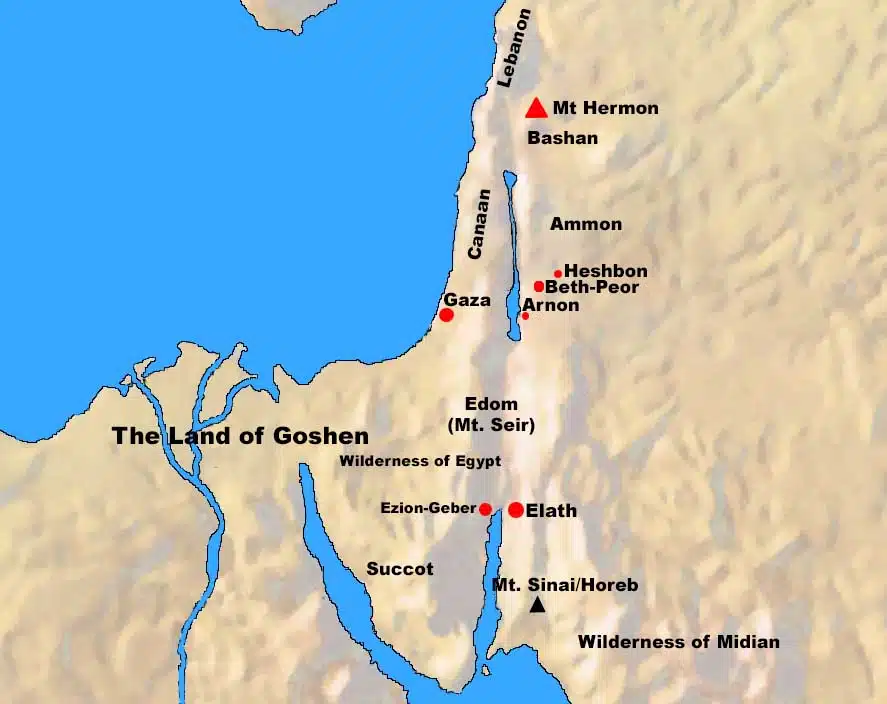Moses reminds the Israelites of how they defeated King Sihon and King Og, and captured their territories. With the defeat of Og, the giant race called “Rephaim” was completely gone.
This section provides a summary of the victory of the Israelites over King Sihon of Heshbon and King Og of Bashan. After the defeat of these two kings, the Israelites took their land. Moses stated, “Thus we took the land at that time from the hand of the two kings of the Amorites who were beyond the Jordan, from the valley of Arnon to Mount Hermon.” The text identifies both kings as Amorites, thus subject to complete destruction. The distance between the valley of Arnon in the south to Mount Hermon in the north was about 140 miles long. This clearly shows the extent of Israel’s victory.
In a parenthetical note, the author tells us that Sidonians call Hermon “Sirion” but the Amorites call it “Senir.” The Sidonians were the inhabitants of the Phoenician city, Sidon, a port city located in modern Lebanon on the Mediterranean coast. We also learn that the total military operations included all the cities of the plateau and all Gilead and all Bashan, as far as Salecah and Edrei, cities of the kingdom of Og in Bashan. Salecah was a town located on the southwestern edge of Mount Hauran in Syria, and Edrei was a town located near the Jordanian border, not far from the Syrian site called “Ashtaroth.” These two towns were part of the kingdom of Og in Bashan.
Finally, the biblical text confirms that Og was the last of the Rephaim, an ancient race of giants living in Palestine during the time of Abraham (Genesis 15:20; Deuteronomy 2:11). Moses stated, “only Og king of Bashan was left of the remnant of the Rephaim.” So, King Og was also from that giant race and this fact alone can explain why the Israelites might have feared him and his army. God had good reason to strengthen His people by telling them not to fear Og. Such a reassuring statement was needed to prepare Israel’s minds for the battle so that they could be victorious.
Apart from being a giant, King Og was also remarkable. The text tells us that his bedstead was an iron bedstead; it is in Rabbah of the sons of Ammon. The place called “Rabbah” was the capital of ancient Ammon. Today, it is called “Amman,” and is the capital of Jordan. Furthermore, we learn thatthe bedstead was long. Its length was nine cubits and its width four cubits by ordinary cubit.” A cubit was the length of a forearm. So assuming an eighteen inch cubit, Og’s iron bed would have been thirteen and a half feet long. The rhetorical purpose of this background note regarding Og was to show his magnificence. Presumably he needed such a massive bed made of iron to hold up under his great size and weight. Yet, as great as King Og was, the LORD of hosts delivered him into the hands of the Israelites because the LORD is all-powerful. Thus, with the destruction of Og, the giant race called “Rephaim” was completely gone.
Biblical Text:
8 Thus we took the land at that time from the hand of the two kings of the Amorites who were beyond the Jordan, from the valley of Arnon to Mount Hermon 9 (Sidonians call Hermon Sirion, and the Amorites call it Senir): 10 all the cities of the plateau and all Gilead and all Bashan, as far as Salecah and Edrei, cities of the kingdom of Og in Bashan. 11 (For only Og king of Bashan was left of the remnant of the Rephaim. Behold, his bedstead was an iron bedstead; it is in Rabbah of the sons of Ammon. Its length was nine cubits and its width four cubits by ordinary cubit.)
Check out our other commentaries:
-
Genesis 24:32-41 meaning
At dinner, Abraham’s servant explains his reason for coming to Haran. He tells Rebekah and her family of Abraham’s wealth, that he has been blessed...... -
Zechariah 9:9-10 meaning
The LORD urges the Judeans to rejoice because the long-awaited righteous king is coming. He will stop all wars and bring peace to the whole...... -
Acts 10:44-48 meaning
The Gentiles Believe in Jesus and Receive the Holy Spirit The Gentile Roman audience to Peter’s gospel message believe in Jesus. Immediately the Holy Spirit enters...... -
The Mosaic Covenant: A Conditional Covenant meaning
This covenant is an agreement between God and Israel, adding various conditional promises to the unconditional promises of God. ...... -
Exodus 39:30-31 meaning
Attached to the turban was its most prominent feature—the plate. It was engraved and fastened to the turban with a blue sash.......




